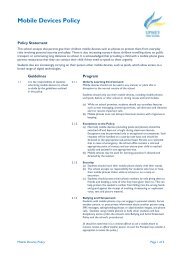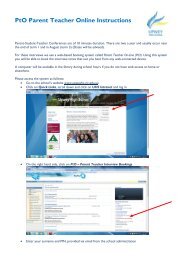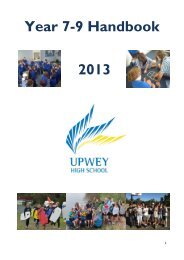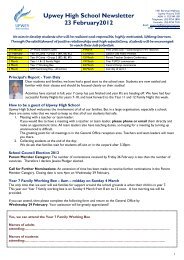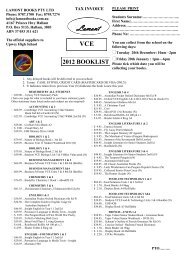First Aid Policy - Upwey High School
First Aid Policy - Upwey High School
First Aid Policy - Upwey High School
Create successful ePaper yourself
Turn your PDF publications into a flip-book with our unique Google optimized e-Paper software.
<strong>First</strong> <strong>Aid</strong> <strong>Policy</strong><br />
Appendix A - Managing Students with Special Health Needs<br />
Any information provided to the school on the enrolment form or separately will be taken into account<br />
when planning the care of a student. Where students have a health care need identified after enrolment,<br />
the same steps will be followed.<br />
1. When a need is identified<br />
Parents/carers are required to provide accurate information about a student’s routine health and personal<br />
care support needs, and emergency care needs, for example:<br />
• predictable emergency first aid associated with an allergic reaction, seizure management, anaphylaxis, or<br />
diabetes<br />
• routine supervision for health care safety, such as supervision of medication<br />
• personal care, including assistance with personal hygiene, continence care, eating and drinking, transfers<br />
and positioning, and use of health-related equipment.<br />
Parents/carers and students will be informed when their information is being collected about how their<br />
personal information will be used and to whom it might be disclosed. For example, to school nurses, who<br />
will require access to relevant student information in order to provide appropriate services too.<br />
Medical advice is required from the student’s medical/health practitioner if there is an indication that a<br />
student has a health care need. The medical advice received must provide relevant information about the<br />
student’s medical condition and document recommended emergency and routine health and personal care<br />
support for the student. Ideally medical advice should be sought via the completion of a relevant Medical<br />
Advice Form.<br />
For any student requiring medication whilst at school, the school must receive written directions ideally<br />
from the student’s medical/health practitioner. This can be done so via the completion of a Medication<br />
Authority Form or ASCIA Action Plan for anaphylaxis or <strong>School</strong> Asthma Action Plan for asthma (see<br />
Victorian Government <strong>School</strong>s Reference Guide 4.5.3.1).<br />
Information about the student’s health condition as well as medication to be stored and supervised at<br />
school should be loaded in Cases21 Database.<br />
The development of a Student Health Support Plan (see Victorian Government <strong>School</strong>s Reference Guide<br />
4.5.3.1) (or in the case of Anaphylaxis an Anaphylaxis Management Plan (see 4.5.10.2)) will occur after the<br />
school has received the appropriate medical advice from the student’s medical/health practitioner. If there<br />
is a time delay between receiving this advice and in the development of a Student Health Support Plan, the<br />
school may decide to put in place an interim support plan outlining an agreed interim strategy, e.g. call an<br />
ambulance immediately.<br />
Plans should be developed when a student is to attend school excursions and camps. The parent/carer<br />
should complete a Confidential Medical Information for <strong>School</strong> Council Approved <strong>School</strong> Excursion<br />
(4.4.2.5).<br />
<strong>First</strong> <strong>Aid</strong> <strong>Policy</strong> Page 4 of 8



